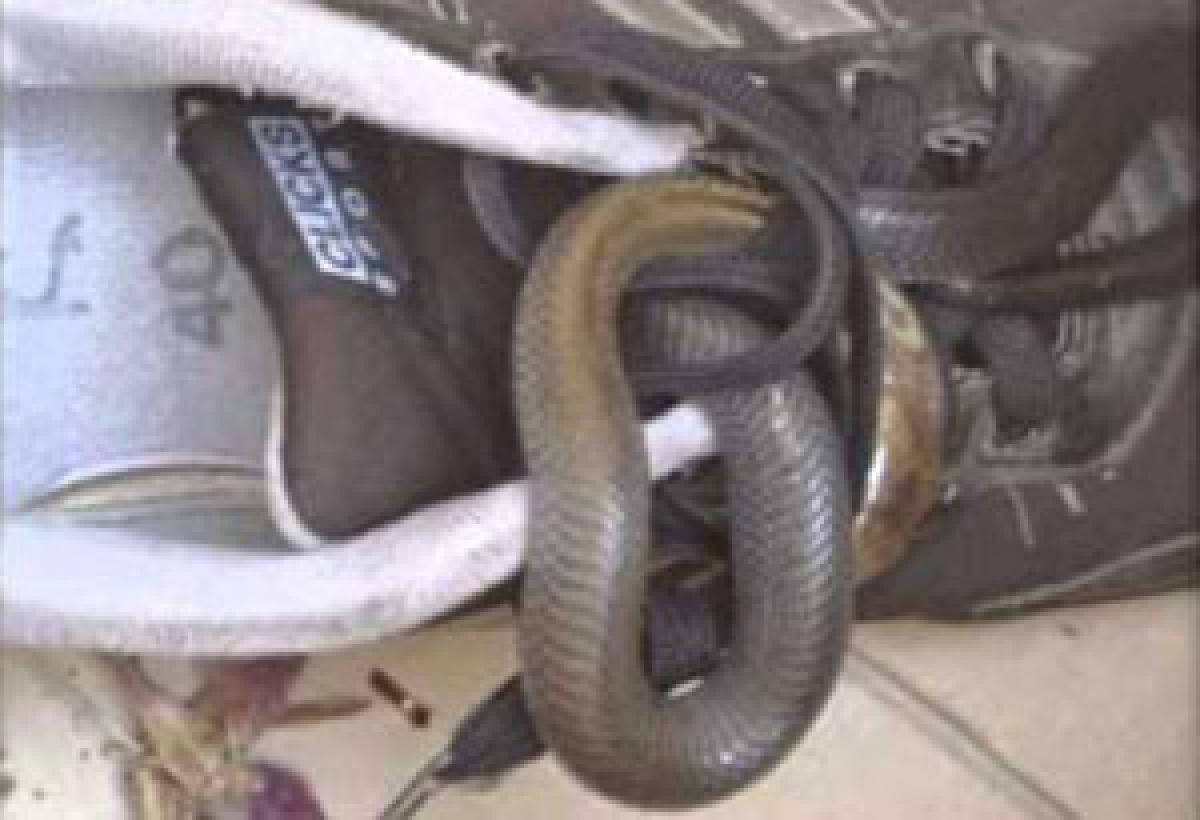Live
- 555th Prakash Purab celebrated with gaiety
- Good news for Atmakur farmers
- High-risk aortic valve replacement surgery performed successfully
- HMWSSB MD holds review meeting on OTS-2024 scheme
- Dhobi Ghat assessed for potential to host sports complex
- SCR bets on LHB train coaches for safety
- SVU felicitates best teachers
- Tata Group to market Araku coffee
- Union Min assures development of infra in tribal mandals
- KTR, Harish will turn political rivals soon: TPCC Chief
Just In

Snakes are middle-order predators in the food chain, their absence would cause a dangerous explosion in population numbers of their prey like rats, mice and lizards
New Delhi: Imagine a scenario where you find a cobra curled up in your shoe, a common krait in your scooter cabinet, or a rock python in your apartment. Don't make any move to kill it, say reptile rescuers: Call Wildlife SOS instead.
Every month, some 200 to 300 incidents are reported in Delhi when people spot a snake.
According to wildlife experts, with snake sightings likely to increase during the monsoon, people should keep calm and not try to engage, catch or kill the reptile.
"Snakes are incredibly important to the ecosystem, they control vermin and rodent population in the cities. They are also apparently the best indicators of environmental contamination," Kartick Satyanarayan, co-founder of Wildlife SOS that runs a 24-hour wildlife and reptile rescue helpline in the National Capital Region, told IANS.
Delhi is home to about 13 species of snakes, of which only two -- the common cobra and common krait -- are venomous. The others include Royal Snake, Wolf Snake, rat snake, Common Sand Boa, Red Sand Boa, Common Kukri, cat snake, rock python, Bronze Back Tree Snake, Leiths Sand Snake, and Checkered Keelback.
About 2,400 to 3,000 snakes are rescued in Delhi every year. Places from where serpents have been rescued include 7, Race Course Road, the prime minister's official residence, and Rashtrapati Bhawan.
"Snakes are the indicator species which means that they become the first victims of climate change. In a manner, their presence assures our presence," Kartick said.
"We don't realise their importance, while the fact is that without them we will be harassed by the rodents and other pests," he added.
Dismissing common misconceptions, V.B. Dasan from Delhi Forest Department said that snakes pose no danger to humans.
"Snakes only get aggressive when they are either engaged, cornered or attacked. They would always try to flee instead of fighting. It's wrong, and in many cases illegal, to kill them," Dasan told IANS.
There have been some cases of snake bites but they are exceptionally few.
While many see snake as encroachers, experts say that its humans who have encroached on their homes. "They are spotted where they had been living, they had always been there. It's us who have moved to their place. Now they are struggling to survive in gutters and drains," Kartick said.
He said that unlike several countries, India unfortunately doesn't conduct Environmental Impact Assessment (EIA) to compensate for the space taken from snakes and other species living in an area.
"Countries like the US, the UK and Singapore conduct EIA before any project is started, be it an airport, highway or a shopping mall. Under this, species like snakes, porcupines, birds, squirrels and others living at a site are assessed and relocated in a separate and similar habitat, which may be developed for them. This also reduces man-animal conflict," said Kartick.
He adds that in India EIA is only based on the vegetation, that too for a very large project, but not on the affected fauna.
Urban spaces also tend to have large population of vermin like rats and mice which attracts snakes.
"The fear people have of snakes makes any human inhabited area non-supportive of them, as they are generally viewed as dangerous and killed on sight. People should be more tolerant and respectful towards this species," said Kartick.
He says that snakes are perhaps one of the best friends for the farmers, as about 20 percent of crop is often lost to rodents.
Forest department officials say that snake sightings have increased recently in Delhi. However, this is not a good sign, as more sighting, especially during daytime hours, is attributed to disturbance among the snakes, either because of humans, habitat destruction or modification or due the proliferating rodents in Delhi, often because of poor garbage treatment.
Experts also maintain that the snake population has declined in Delhi mostly due to climate change or killings.
"Snakes are middle-order predators in the food chain, their absence would cause a dangerous explosion in population numbers of their prey like rats, mice and lizards," said Kartick.
"We must learn to co-exist. If someone spots snakes around their house, I would suggest they should reach on the helpline 919871963535 or write to us at [email protected]. We will help. Just don't kill them," he urges.

© 2024 Hyderabad Media House Limited/The Hans India. All rights reserved. Powered by hocalwire.com







